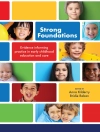With the expertise of a body of international contributors from Australia, Canada, USA, UK, Finland, The Netherlands, Italy, Greece and Chile, this handbook explores key in-depth issues in quality Early Childhood Development and Education. Unlike previous publications in the discipline, this title combines research and practice to investigate emotional and social development, wellbeing and mental health, language, cultural environments, as well as the role of parents in a child′s development. It is divided into six key parts:
Part I: Emotional Development
Part II: Social Development
Part III: Play, Development and Learning
Part IV: Memory and Understanding
Part V: Learning, Language and Literacy
Part VI: Executive Functions, Metacognition and Self-Regulation
विषयसूची
Senior Editor’s Introduction: the contribution of research in developmental psychology to early childhood education – David Whitebread
Part I: Emotional Development
Chapter 1: Attachment and Parenting in the Preschool Years – Jean-Francois Bureau, Audrey-Ann Deneault, Jodi Martin & Kim Yurkowski
Chapter 2: Emotional Self-regulation and Reactivity, School-based Relationships, and School Engagement and Achievement – Jeffrey Liew, Carlos Valiente, Maciel M. Hernández, & Dame Abrera
Chapter 3: The Role of Pretend Play in Supporting Young Children’s Emotional Development – Zhen Rao & Jenny Gibson
Chapter 4: Researching Resilience Processes in Children’s Everyday Lives During Transitioning to School: A Dialogic Approach – Kristiina Kumpulainen & Linda Theron
Chapter 5: Whole-of-Setting Approaches to Enhancing Factors That Support Children’s Social and Emotional Skills During Transitions – Lyn O’Grady, Amelia Joyce & Cate Engelbrecht
Part II: Social Development
Chapter 6: Social and Emotional Skill Development in Early Childhood – Shauna L. Tominey, Svea G. Olsen & Craig Bailey
Chapter 7: How Others Shape Self – Jane Webb-Williams
Chapter 8: Children’s Friendships and Social Development – Christian Berger, Olga Cuadros & Antonius H. N. Cillessen
Chapter 9: Learning to Read Mind: A Synthesis of Social and Cognitive Perspectives – Claire Hughes & Rory Devine
Chapter 10: Triadic Interactions for the Development of Social and Emotional Competences – Luisa Molinari, Ada Cigala & Paola Corsano
Part III: Play, Development & Learning
Chapter 11: Securing the Future of Play in Early Childhood Education: Journeying with Children toward the Essence of Play to Evidence its Function and Value – Justine Howard
Chapter 12: Playing at, Participating in, and Transforming Cultures: A Vygotskian Perspective on the Potential of Early Childhoods – Jennifer A. Vadeboncoeur & Maryam Dalkilic
Chapter 13: Playing for the Future: Redefining Early Childhood Education – Emily J. Hopkins, Tamara Spiewak Toub, Brenna Hassinger-Das, Roberta M. Golinkoff & Kathy Hirsh-Pasek
Chapter 14: Educational Play-Supervision – Playing and Promoting Children’s Development of Meaning – Pernille Hviid
Chapter 15: New Play: A Pedagogical Movement for Early Childhood Education – Susan Edwards, Susan Greishaber, Joce Nuttall & Elizabeth Wood
Part IV: Memory and Understanding
Chapter 16: Developing Skills for Remembering in Early Childhood – Catherine A. Haden, Maria Marcus & Pirko Tõugu
Chapter 17: How Children Learn: Implications for Early Childhood Education – David Whitebread & James Adams
Chapter 18: Number Concept Development in Early Childhood – Sonia White
Chapter 19: Exploring, Imagining, Sharing: Early Development and Education in Science – Keith Taber
Chapter 20: Conceptual Development of Prosocial Behaviors across Childhood: The Role of Moral Cognitions and Moral Emotions – Paula Luengo, Federica Zava & Consuelo Huerta
Part V: Learning, Language and Literacy
Chapter 21: Contexts for the Development of Language and Literacy in Latin America – Katherine Strasser
Chapter 22: Early Language and Literacy Development in the Finnish Context – Marja-Kristiina Lerkkanen
Chapter 23: Language and Literacy in the USA – Frederick J. Morrison, Carol M. Connor, Adrienne Woods & Rebecca Marks
Chapter 24: Language Learning Challenges in the Early Years – Julie Dockrell
Chapter 25: Approaches to Early Literacy Development from a Multiliteracies Standpoint: A Case Study of Aboriginal Supported Playgroups – Libby Lee-Hammond & Sandra Hesterman
Part VI: Executive Functions, Metacognition and Self-Regulation
Chapter 26: The Development of Self-Regulation in Young Children – Megan M. Mc Clelland, Claire E. Cameron & Jessica Alonso
Chapter 27: Concurrent and Longitudinal Associations between Parenting, the Home Environment and Student Self-Regulation in Early Childhood – Deborah Pino-Pasternak, Debora Valcan & Anabela Malpique
Chapter 28: Emotional Self-Regulation in the Early Years: The Role of Cognition, Metacognition and Social Interaction – Anastasia Efklides & Plousia Misalidi
Chapter 29: Understanding the Role of Motivation in Children’s Self-Regulation for Learning – Nancy E. Perry, Simon Lisaingo & Laurie Ford
Chapter 30: Supporting Young Children’s Self-Regulation Development – Valeska Grau & David Preiss
Conclusion: The Importance of Play, Oral Language and Self-Regulation in Children’s Development and Learning; Implications for Quality in Early Childhood Education – David Whitebread, Marisol Basilio, Lisha O’Sullivan & Antonia Zachariou
लेखक के बारे में
David Whitebread is Senior Lecturer in Developmental Psychology and Early Years Education in the Faculty of Education, University of Cambridge.David Whitebread will be discussing key ideas from Developmental Psychology and Early Childhood Education in the SAGE Early Years Masterclass, a free professional development experience hosted by Kathy Brodie. To sign up, or for more information, click here












